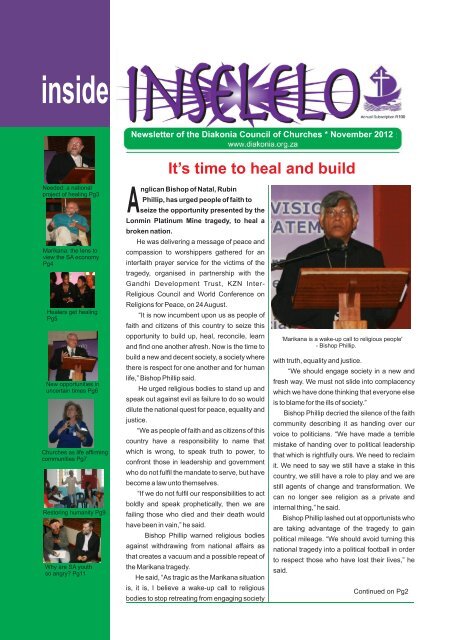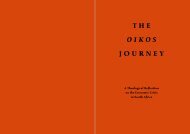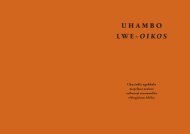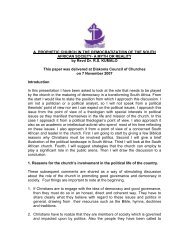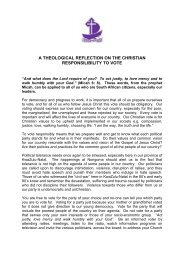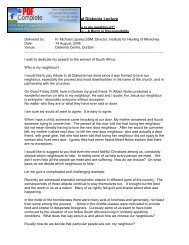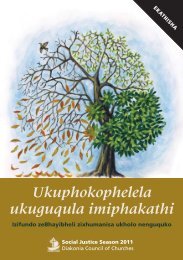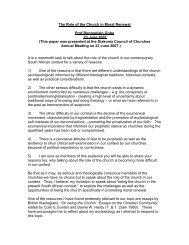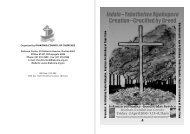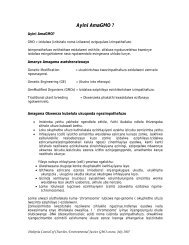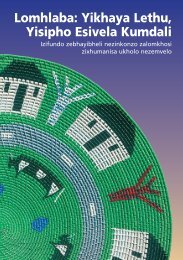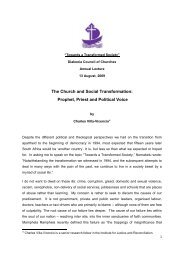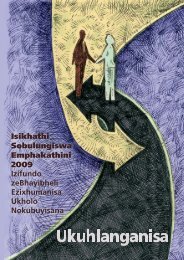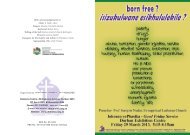Inselelo November 2012 - Diakonia Council of Churches
Inselelo November 2012 - Diakonia Council of Churches
Inselelo November 2012 - Diakonia Council of Churches
- No tags were found...
Create successful ePaper yourself
Turn your PDF publications into a flip-book with our unique Google optimized e-Paper software.
INSELELO NOVEMBER <strong>2012</strong> - PG 3Needed: a national project <strong>of</strong> healingSouth Africa urgently needs a national project <strong>of</strong>healing. This is according to Fr Michael LapsleySSM, Director <strong>of</strong> the Institute for Healing <strong>of</strong> Memories.Fr Lapsley was launching his memoir Redeeming the Past:My journey from freedom fighter to healer, during thecolloquium on South Africa's unfinished business, jointlyhosted with the Institute for Healing <strong>of</strong> Memories andEnviroworld, on 11 September.“This year, there have been rapidly increasing signs that weremain a deeply traumatised nation. We urgently need to havea national conversation about our multiple woundedness. Todo so, we need a new language - not <strong>of</strong> the head but <strong>of</strong> theheart. We need to find ways not <strong>of</strong> shouting at one another but<strong>of</strong> listening to one another's pain.“We all know that our wounds as a people stretch backthrough the centuries and that as individuals and communitieswe have suffered intergenerational trauma. The wounds <strong>of</strong> thepast continue to infect the present. And so the healing journeywill continue to be one <strong>of</strong> our tasks and callings for generationsto come. The question for all <strong>of</strong> us is have we begun thejourney?” Fr Lapsley asked.Redeeming the Past, he said, is about hope. “In the book,you will hear a number <strong>of</strong> voices from across the worldspeaking <strong>of</strong> their pain and the journey they are travelling. In itsmodest way, may this book increase awareness andcommitment to healing <strong>of</strong> memories everywhere in the world,”Fr Lapsley concluded.Fr Lapsley calls for a national project <strong>of</strong> healing.In his keynote address, Bishop Rubin Phillip saidhe has always admired Fr Lapsley's courage, his passionfor justice and the personal sacrifice he made in the questfor peace and justice in the country.He said South Africa is a nation in need <strong>of</strong> healing and thatRedeeming the Past spreads the message <strong>of</strong> hope - thathealing is possible, at a time when people feel so hopelessand even have a fatalistic approach to life.“The book does not simply say healing is needed, but that itis possible. Despite all the challenges, suffering, anger anddisillusionment, the healing which our society so desperatelyneeds is actually possible. Of course not everybody agreeswith that, which is why we need to be shouting the slogan fromthe ro<strong>of</strong> tops: 'Healing is possible'. As a society, if we do notbegin to deal with some <strong>of</strong> the deep hurts, we will not moveforward,” Bishop Phillip said.In the plenary session on South Africa's UnfinishedBusiness that followed in which KZN Premier Dr Zweli Mkhize,KZN violence monitor Mary de Haas and co-author <strong>of</strong> thebook Stephen Karakashian joined Fr Lapsley and BishopPhillip on the panel, there was general concern that the churchmade a mistake <strong>of</strong> stepping aside after the demise <strong>of</strong>apartheid thinking that the struggle was over. Delegates als<strong>of</strong>elt that partnerships between church and state should beencouraged, but the former should maintain itsindependence.De Haas makes a contribution during the colloquium.
INSELELO NOVEMBER <strong>2012</strong> - PG 4Marikana: the lens to view the SA economyThe tragic incidents at the Lonmin Platinum Mine inMarikana in August which left 44 people dead,more than 70 injured and approximately 250 behindbars shook the nation to the core and shocked the world.How could such a massacre, reminiscent <strong>of</strong> apartheid erarepression, happen nearly two decades into democracy?To answer this and many more questions and determinewhat we can learn from these events, <strong>Diakonia</strong> <strong>Council</strong> <strong>of</strong><strong>Churches</strong> organised a briefing on 9 October.In his presentation, Bench Marks Foundation leadresearcher David van Wyk said what happened in Marikanacould have happened and can still happen anywhere in theSouth African economy, adding that Marikana was not an eventbut a process.Molebatsi says miners literally live in concentration camps.Van Wyk says Marikana was not an event but a process.He said, “Marikana was a culmination <strong>of</strong> a series <strong>of</strong>protests that swept through the district, beginning with theunprotected industrial action at the Karee in May 2011, thecommunity uprising <strong>of</strong> August <strong>of</strong> the same year, continuouscommunity battles with mines such as Marikana, Ikemeleng,Ledig, Chaneng and the job protests by Nkanengcommunity’s unhappiness about the unemployment <strong>of</strong> localsby the mine.”Co-presenting with him, Chris Molebatsi a member <strong>of</strong> thecommunity group that monitors the Corporate SocialInvestment <strong>of</strong> Lonmin Mine and the impact <strong>of</strong> miningactivities on the community, blamed the socio-economicconditions <strong>of</strong> the country's mineworkers and miningcommunities for the tragedy. The Marikana massacre, hesaid, was a reminder <strong>of</strong> the abject poverty and inhumaneliving conditions faced by mining communities.He said, “There is massive youth unemployment inMarikana. The mine still relies on migrant labour. Most minerslive in shacks which are like concentration camps. Because <strong>of</strong>overcrowding, sewer pipes are <strong>of</strong>ten blocked with raw sewageflowing freely on the streets. Because <strong>of</strong> such living conditions,there are high levels <strong>of</strong> illiteracy and social ills such as teenagepregnancies, HIV and AIDS and crime.”Molebatsi also spoke about the abuse <strong>of</strong> women minersthat is rampant at the mines. “Mining companies just want tomeet their quota <strong>of</strong> the number <strong>of</strong> women miners but do not doanything about their safety. We always receive reports <strong>of</strong>women who are raped or sexually abused by their malecounterparts,” he said.Van Wyk noted that while mining remains the bedrock <strong>of</strong>South Africa's economy, there is a need for the industry toadhere to international standards by building long termrelations with mining communities and contribute tomeaningful material change in the lives <strong>of</strong> communities.He also expressed concern at the inequality between theminers' wages and the outrageous salaries and bonus <strong>of</strong> themine management.“The 2011 wage gap between the CEO and the averageworker in the industry was 390 to 1. The average worker had towork for 325 years to earn the value <strong>of</strong> the CEO's 2011remuneration,” van Wyk said.
INSELELO NOVEMBER <strong>2012</strong> - PG 5Healers get healingUsually when one asks caregivers how they arefeeling, they talk about their patients and theirpain, instead <strong>of</strong> paying attention to their ownsuffering. What is important to them is saving otherpeople's lives.In August, a group <strong>of</strong> Ithubalethu caregivers fromKwaMashu took time <strong>of</strong>f their usual work <strong>of</strong> caring for others,to take care <strong>of</strong> themselves. At the beginning <strong>of</strong> theworkshop, one woman said she did not even know whatstress is and yet she discovered later that she experiences itdaily. Domestic violence, poverty, child abuse and deathemerged as causes <strong>of</strong> that stress.In small groups the caregivers discussed theirunderstanding <strong>of</strong> stress and trauma as well as the differencebetween the two, using newspaper cuttings as their guide.They were able to identify their own experiences withpictures from newspaper cuttings.They spent time sharing their stories which led them tobetter understand one another's experiences. Manyremarked that it felt great to be listened to.At the end <strong>of</strong> the workshop, participants felt healed and atease that they were not alone in their situations. Theproject's coordinator, Zanele Mkhize said, “This workshophelped us to connect with each other and keptcommunication going as colleagues.”nokufundana kabusha. Ithuba lokwakha umphakathiomusha onesithunzi nenhlonipho nowazisanayo,” kushouMbhishobhi.Uphinde wanxusa izinhlangano zabakholwayo ukubazisukume ziziqhelelanise nezenzo zenkohlakalo.Ukungenzeki kwalokhu kuzoholela ekubhuntshiseniimizamo yokuthula, nasekuqedeni ukungalinganikwamazinga empilo nobulungiswa.“Thina bezenkolo nabantu balelizwe simelweukuphumela obala ngokungalungile okwenzekayosibhekise ngqo kwiziphathimandla zezwe nohulumeniongazifezi izidingo zabantu, kodwa ozenzela umathanda.Uma sedembesela ukukhuluma ngesibindi nokuxwayisasiyobesidicilela phansi iqhaza elabanjwa ngabafa, befelainkululeko yethu,” usho kanje eqhubeka.UMbhishobi Phillip unxuse izinhlangano zabakholwayoukuba zizibandakanye ezindabeni zikazwelonke ukuvalaisikhala sezwi labantu. Uthe lokhu kungase kudaleukuqubuka kwezehlo ezifuze inhlekelele yaseMarikana.Eqhubeka uthe, “Ibanga usizi indaba yaseMarikana.N g i k h o l w a u k u t h i i p h a p h a m i s a a b a k h o l w a y oa b a s e z i n h l a n g a n w e n i u k u b a b a z i q h e l e n a n i s enokukhuluma iqiniso, ukulinganiswa kwamazinganobulungiswa. Simele sixhumane nomphakathi ngendlelaentsha nevulelekile. Akumele sizithele ngabandayonjengokukhombana amaphutha abanye.”Enkulumweni yokwamukela amakholwa enkonzweniThe healers discuss in groups while observing Thursdays in Black.Sekuyisikhathi sokupholisa nokwakhaUSobaba Rubin Phillip uMbhishobhi webandlalamaSheshi eNatali ukhuthaze abezenkoloukuba babambe iqhaza ngethuba elivezweinhlekelele emayini Lonmin Platinum, ekupholiseniamanxeba kwisizwe esilimele. Ubedlulisa umyalezowokuthula nozwelo kulabo ababesenkonzweni yezinkoloezahlukene ababehlanganele ukududuza abashonelwe.Lokhu kwenzeke e-<strong>Diakonia</strong> ngomhlaka 24 Agasti.“Sekusemahlombe abezenkolo nabantu bonke balelizweukubamba iqhaza lokwakha, ukupholisa, ukubuyisanauSiHlalo woMkhandlu wamabandla i-<strong>Diakonia</strong>, uMfundisiIan Booth, uthe akusesona isikhathi sokwenzai n k o m b a n k o m b a n e n g o k o n a k e l e k o d w angesokuzimbandakanya nabasosizini, sihlumeleliseukholo, sibemunye nabalilayo.Uphinde waxwayisa ngokuthi lenhlekeleleiseyisixwayiso, njengesihloko sethumba. Eseqedelainkulumo yakhe uthe, “Ingozi wukuthi isengaba luphawulwesimo esingaba nomthelela omubi kakhulu. Kukekwabakhona izexwayiso zokuthi kungase kuqhume gulalinamasi. Manje sesibona ukuthi impela kungasekubekhona okunye okucathamayo,” kuphetha uMfundisiBooth.
New opportunities in uncertain timesTo survive in these uncertain times, Non-Pr<strong>of</strong>itOrganisations (NPOs) should establishrelationships with the business community.This is according to Andrew Layman, CEO <strong>of</strong> theDurban Chamber <strong>of</strong> Commerce and Industries.Layman was delivering the annual <strong>Diakonia</strong> Lectureon 24 August.He said traditional foreign donors are withdrawingtheir aid to the country because they are under theillusion that there is now in place a government <strong>of</strong> and forthe people, and so social organisations are no longernecessary.Prior to 1994, Layman said, the South African <strong>Council</strong><strong>of</strong> <strong>Churches</strong> (SACC) was one <strong>of</strong> the few civil societyorganisations in existence. But post 1994, numerousNPOs mushroomed, making the terrain verycompetitive.Business people want to donate, he said, adding thatthey seek credible organisations, and not fly-by-nightbriefcase organisations that are meant to enrich thefounders. The challenge then is for NPOs to align theiractivities in such a way as to be attractive to businessfunding.Layman encouraged NPOs to be creative inmarketing themselves. “One <strong>of</strong> the ubiquitous problems<strong>of</strong> non-pr<strong>of</strong>its is that they do not know how to marketthemselves. A lot <strong>of</strong> effort needs to be put on marketing,”he said.INSELELO NOVEMBER <strong>2012</strong> - PG 6T-shirts for saleLayman urges NPOs to be creative in marketing themselves.Layman also spoke out against the business communityaccusing it <strong>of</strong> being greedy. “The challenge <strong>of</strong> the businesscommunity is to 'ungreed' itself. The country has too manyproblems for anybody to be greedy,” he said.The Lecture is an opportunity to listen to and learn fromleaders from a variety <strong>of</strong> backgrounds, and the theme andspeaker are mostly dictated by current circumstances.This richly- illustratedc<strong>of</strong>fee-table book chartsthe background andhistory <strong>of</strong><strong>Diakonia</strong>’s annual GoodFriday services inDurban, South Africa“This is a very fine volume“This with is its a very combination fine volume <strong>of</strong> textwith and its many combination memorable <strong>of</strong> textand many memorablephotographs”photographs”BishopBishopMichaelMichael&&DorrieDorrieNuttallNuttallAvailable from <strong>Diakonia</strong> <strong>Council</strong> <strong>of</strong> <strong>Churches</strong>@R20 each*Support the work <strong>of</strong> our oganisationDiscount on bulk ordersContact Busi: 031 310 3500Email: reception@diakonia.org.zaAvailable from <strong>Diakonia</strong> <strong>Council</strong> <strong>of</strong> <strong>Churches</strong>ONLY R100 (+R50 packaging and postage)USD 80 (includes bank charges, p&p)Euro56 (includes bank charges, p&p)Contact Busi:+27 31 310 3500Email: reception@diakonia.org.za“It belongs on the shelves <strong>of</strong>books that will never leave us.”Gert van Maanen, Neatherlands
INSELELO NOVEMBER <strong>2012</strong> - PG 7<strong>Churches</strong> as life affirming communitiesLife-affirming churches should becommunities <strong>of</strong> care, according to Pr<strong>of</strong>Christina Landman, Research Director at theResearch Institute for Theology and Religion at theUniversity <strong>of</strong> South Africa (UNISA).Pr<strong>of</strong> Landman was facilitating the bi-annualEcumenical Conference on 25 August.She chronicled communities <strong>of</strong> care in the biblicaltradition, seeing Jesus' and his disciples as forming acommunity that cared for those who were on the margins<strong>of</strong> society, like widows, adding that Jesus' parables had aconcern for the underprivileged.“Jesus' parables related to common people, not to therich and powerful. In his parables, even those withoutrights were included in the reign <strong>of</strong> God,” she said.Pr<strong>of</strong> Landman said in the context <strong>of</strong> HIV and AIDS,poverty and abuse <strong>of</strong> women and children, churchesshould be life-affirming. <strong>Churches</strong> should, in thissituation promote healing through preaching, liturgy andcounselling.In groups delegates discussed how the church couldbe more life-affirming. It emerged that churches shouldcreate more safe spaces for communities to share theirchallenges and explore means <strong>of</strong> solving them. It alsoemerged that life-affirming churches should have astrong prophetic voice and should recognise thatmorality is not only personal, but also applies to publicpolicy and decision making.Pr<strong>of</strong> Landman expresses a point.The Ecumenical Conference is held every other year andalternates with the Social Justice Season. It aims to promotefellowship, information sharing, motivation and inspiration towork for social justice within the <strong>Diakonia</strong> family.
INSELELO NOVEMBER <strong>2012</strong> - PG 8Bishop challenges womento stand up and demand justiceAuxiliary Bishop <strong>of</strong> the Catholic Archdiocese <strong>of</strong>Durban, Barry Wood OMI challenged women tostand up and unite to bring about social justice.Bishop Wood was delivering the homily in a service tocelebrate Women's Day at Emmanuel Cathedral, attendedby thousands <strong>of</strong> women from the various parishes <strong>of</strong> theArchdiocese, on 8 August.He encouraged the women to emulate the courageouswomen who marched to the Union Buildings in 1956 toprotest against the degrading pass laws. “Their courage,determination and bravery encouraged many to rise andprotest against the injustice and oppression <strong>of</strong> the apartheidregime,” the Bishop said.Bishop Wood also gave biblical examples <strong>of</strong> courageouswomen. He said, “In the Gospel <strong>of</strong> Luke, Mary <strong>of</strong> Nazarethsings her song <strong>of</strong> joy and thanksgiving. In her song thisyoung teenager sings these subversive words: 'God willbring down the mighty from their thrones and lift up thelowly. God will fill the hungry with good things and send therich away empty'. These were dangerous and courageouswords because the 'mighty' referred to the Roman Empire,Herod and the religious leaders <strong>of</strong> the time, who kept thepeople in subjection and oppression.In this song Mary hungers for the new justice on earth,one that reflects the justice <strong>of</strong> God. She voices a radicalprotest against the mighty who always seem to prevail,against the rich who are well fed while the poor starve. Godwill dethrone the mighty and exalt the lowly.”With these two examples <strong>of</strong> courageous women - thewomen <strong>of</strong> 1956 and Mary - the Bishop encouraged thewomen to join hands and to work together to bring abouteconomic justice and equality, and to eradicate poverty thatthe majority <strong>of</strong> South Africans experience.Speaking during the morning about the role womenplayed during the struggle for the liberation <strong>of</strong> South Africa,Lydia Johnson said some <strong>of</strong> the women were highlyeducated and successful in life, yet they took a decision tojoin the struggle for the liberation <strong>of</strong> the country.The march in 1956 is regarded as an important step inliberating South Africa, she said.Sipho Mnguni addressed the women on justice andpeace issues and encouraged them to begin Justice andPeace groups in their parishes.The morning was a tribute to the women <strong>of</strong> theArchdiocese who are the 'power base' <strong>of</strong> the church.Umbhishobhi uphonsa inselelokwabesifazane ukuba basukumebalwele ubulungiswaUMbhishobhi osizayo u-Barry Wood OMI,webandla lamaKhatholika eThekwi uphonsainselelo kwabesifazane yokuba bahlanganebalwele ubulungiswa emphakathini.Ethula intshumayelo emgubhweni wosukulwabesifazane e-Emmauel Cathedral ngomhlaka 8Agasti, kubuthene izindimbane zabesifazaneabebevela kumagatsha amaningi angaphansikwesiFunda Bhishobhi esikhulu, ubakhuthaze kanje:uthe bafanele balandele isibonelo samakhosikaziahlaba udwendwe elibhekise ePitoli ngo-1956 bevezailaka nokuphathwa kwamapasi. “ Isibindi sabonokuzimisela kwakhuthaza nabanye abaningi ukubabazibandakanye nabo ekulweni nengcindezelonokuhlukumezeka ngesikhathi sobandlululo” kushouMbhishobhi.Uphinde wakhuthaza ngokuthi bafaneleb a b a m b a n e n g e z a n d l a k u l o m s h i k a s h i k awokuphumelelisa ubulungiswa kwezomnothonokuqedwa kwamazinga angalingani, kuqedweububha obuhlasele leli lengabade.Sekuphawula uLydia Johnson, obengesinyesezikhulumi kulomcimbi, uthe likhulu kakhulu iqhazaelabanjwa abesifazane enkululekweni. Uqhube washonokuthi abanye babo babesezingeni eliphakemengokwemfundo futhi bezimele kodwa bazibandakanyanokulwa ukuze likhululeke izwe. Leyomashi ka-1956yaba yingqophamlando ekukhululekeni kwezwe.U-Sipho Mnguni naye uqhubeke lapho ekhulumangokulethwa kobulungiswa nokuthula kanyenokusungulwa kwamaqembu azokhankasela lokhuemabandleni wonkana.Kubesekutuswa iqhaza elikhulu elibanjweabesifazane besiFunda Bhishobhi esikhulu ngokuthibangumgogodla webandla.
INSELELO NOVEMBER <strong>2012</strong> PG 9Improving food securityto end hungerRestoring humanityGenetically Modified Organisms (GMOs) willnot solve the hunger crisis in Africa and theworld. This is according to Mariam Mayet <strong>of</strong>the African Centre for Biosafety.Mayet was speaking at the World Food Day celebrations,under the theme 'Improving food security to end hunger' at<strong>Diakonia</strong> Centre, on 16 October.“The argument that 'GMOs will feed the world' is toosimplistic and simply not true. It is too easy for government torely on a 'techno-fix' and ignore the real political issuesunderlying food insecurity, such as land reform, servicedelivery, poverty, unemployment and a whole host <strong>of</strong> otherissues,” Mayet said.The real solution to world hunger, she argued, needspolitical will, innovation and collaboration with farmers,adding that viable alternative systems, such as permaculture,already exist.She dismissed many myths such as GMOs massivelyincrease yield potential and that the GM technology boostsfarmer income and pr<strong>of</strong>itability. Quite the contrary, she said,GM crops do not help small scale farmers because they aredesigned to be used in large-scale industrial farmingsystems. Even there, she said, they have not produced therequired results.Mayet also raised health concerns associated with GMOs.“Tests done on animals (which are also true <strong>of</strong> humans) haveshown worrying health impacts including: inflammations,ulcerations, excessive growth <strong>of</strong> stomach and gut lining, aswell as disturbance <strong>of</strong> liver, pancreas and kidney function,among many others,” she said.Mayet strongly urged food manufacturing and processingcompanies to label GM foods arguing that it is consumers'right to know what is in their food so that they make informedchoices about what they eat.“South Africans have been eating genetically modifiedfood for more than a decade without their knowledge orconsent. Meanwhileforty countries in theworld label GMfoods or havebanned themaltogether,” she said.Speaking at thesame occasion,LawrenceMaduramuthu <strong>of</strong> theeThekwiniMunicipality'sAgroecologyprogramme,encouragedparticipants t<strong>of</strong>orm small farming groups to grow their own food and togenerate income, saying that his programme will give themrelevant assistance.Mayet says GMOs cannot solve the food crisis.About twenty five young people from acrossdenominations gathered at St Anne's CatholicChurch, Chesterville, for a workshop on RestoringHumanity co-organised with the Institute for Healing <strong>of</strong>Memories, on 22 September.Conducted in an interactive way, the workshop had aspecific focus on gender and race. In groups, the youthdiscussed the various types <strong>of</strong> intolerance that they experienceor see on daily basis. Racism, sexism, classism, xenophobiaand homophobia emerged as the major challenges to restoringhumanity.One <strong>of</strong> the youth shares ideas on how to restore humanity.The next activity focused on gender stereotypes and biases.Divided in two groups according to gender, they listed theiropinions and thoughts, both positive and negative, about theopposite sex. It was interesting to find out how each groupperceived the opposite sex.The young people also engaged in a discussion aroundracism. In particular they looked at how religion, education andthe media can help to eliminate racism in our society.The parish priest <strong>of</strong> St Anne's, Fr Peter Sodje Cssp, shared afew words <strong>of</strong> advice with the youth. He urged the young peopleto learn from their elders who have experienced life and knowthe consequences <strong>of</strong> certain choices. He also advised them togive their lives to God and focus fully on their studies.At the end <strong>of</strong> the workshop, Lungelo Msimang, the <strong>Diakonia</strong>Youth Forum intern said he felt satisfied with the proceedingsand learnings <strong>of</strong> the day.“The fact that the workshop was organised and facilitated bythe youth themselves, is very pleasing. The Forum will continueto train and empower young people to take the lead in 'peerdevelopment'. We are planning to conduct such workshops invarious communities in the city. This is the only way forward forthe Forum,” he said.
INSELELO NOVEMBER <strong>2012</strong> - PG 10Advocacy groups shareexperiencesseventy members <strong>of</strong> four advocacy groups fromNsimbini, Luganda, Molweni and Clermonton 29 August.gathered in Clermont for a joint advocacy meeting,The purpose <strong>of</strong> the meeting was to share information andexperiences on lobbying and advocacy for change, as well asactive citizenry, with a view to deepen democracy in theircommunities. The meeting provided an opportunity forbeneficiaries to share their experiences, and how bottlenecksin community development could be avoided.In his keynote address, Sithembiso Madlala, anindependent consultant, spoke about the concepts <strong>of</strong> lobbyingand advocacy and then moved to the practical activities <strong>of</strong> bothconcepts.Also on the panel, was Bongi Sibiya from the Department <strong>of</strong>Social Development who provided information on how to applyand register for NPO status. She gave delegates a perspectiveon social grants and how they could be assessed.SHGs celebrate independenceAbout 200 members from the various Self HelpGroups (SHGs) gathered at Umzinyathi to celebratethe independence <strong>of</strong> twenty two groups,on 24 August.Also in attendance were new members who recentlyadopted the concept, as well as community members, churchleaders and the local Chief Ngcobo's wife.Inkosi Khumalo from KwaBhulushe at Amatata, sent amessage <strong>of</strong> support affirming the SHGs for the good work theyare doing in his area, and encouraging them to take the conceptto other poor areas <strong>of</strong> the province.Testimonies <strong>of</strong> how their lives have changed since theyjoined the groups were shared at the ceremony. Theindependent groups shared that they no longer depend on<strong>Diakonia</strong> for designing their projects, implementing them andlooking for markets for their products.They informed the gathering that they are getting substantialorders for their products from different customers, and that theynetwork with other people from other organisations. One <strong>of</strong> thegroups shared that they opened a traditional outfit market atone <strong>of</strong> their member's house and that they no longer buy fromthe shops some items for household use, such as jam and floorpolish, because they make the stuff themselves.Meanwhile, the SHG concept was introduced to Samungu,Molweni, Emaus, Nazareth and Klaarwater. All these are areasin the Methodist Clerpine Circuit. These groups are guided bythe community facilitators who were trained by <strong>Diakonia</strong>.Delegates share ideas in groups.“The meeting was a success because we were able toshare our stories,” remarked Nosipho Mjoka from Nsimbini.“We need more meetings like these for us to know whatother advocacy groups are doing in their areas,” said HlengiweMakhathini from Clermont.The purpose <strong>of</strong> advocacy groups is to mobilise localchurches and communities to advocate for better and effectiveservice delivery.R150 + R25 forpostage (SA only)Contact Hester Joseph:+27 31 310 3521+27 83 7994136This new, abridgedversion <strong>of</strong> Guardian <strong>of</strong>the Light tells the story<strong>of</strong> how Hurley becamethe youngest Catholicbishop in the world at 31,his fearless criticism <strong>of</strong>apartheid, denouncingit as 'blasphemy' and'intrinsically evil' andbeing regarded as one<strong>of</strong> South Africa's 'mostwanted' politicalopponents and how hecontinued to work asa parish priest well intohis eighties.“Archbishop Hurley was one <strong>of</strong> our greatest South Africans.This biography reveals what gave him that stature – his integrity,fearlessness, gentleness <strong>of</strong> spirit and his magnanimity.It is a must-read for all <strong>of</strong> us.” - Desmond Tutu.
INSELELO NOVEMBER <strong>2012</strong> - PG 11Why are South African youth so angry?Arecent discussion on the impact <strong>of</strong> apartheid warson South Africans, held at <strong>Diakonia</strong> Centre, leftme asking why there is so much anger in our youngpeople and why it is that they seem to be retaliatingagainst the apartheid system more than our elders whoactually experienced its horrors. Why is it that they arestill angry about that horrible past eighteen years afterthe fall <strong>of</strong> apartheid?For many frustrated young South Africans to get by,violence is the solution. The infliction <strong>of</strong> pain onto others isthe only way they can release the tension and frustration <strong>of</strong>unexpressed anger. Unfortunately, because <strong>of</strong> thehopeless situations they find themselves in, repressed by asystem handed down to them, they turn onto each other intheir bid to get ahead. The stigma <strong>of</strong> belonging to a blackcommunity keeps one paranoid, terrified <strong>of</strong> scrutiny orscorn. It is the fear <strong>of</strong> open abuse from one's neighbour - thetownship resident, full <strong>of</strong> venom due to his/her owninferiority complex. To me, it appears that the process <strong>of</strong>healing and reconciliation happened too quickly and ourminds were not properly prepared for the new environment.The greedy quickly forgot what the struggle was allabout as they scurried hastily to collect their millions, whilethe not-so-lucky were left behind to fight over the crumbsthrown at them. Their love for power and wealth has madethem lose sight <strong>of</strong> that vision and instead, they fight to bringone another down.Then you ask yourself 'why are we still so angry'? Couldit be the psychological and genetic inheritance that weadopted from our parents that we see the need tocontinually fight and take back forcefully what belongs tous? Is it because we have been repressed in backwardthinking for so long that our minds have not gotten used tonew ways <strong>of</strong> dealing with issues?The residue <strong>of</strong> the apartheid era left visible divisionsamong races in South Africa. The resentment still lingers inthe tissues <strong>of</strong> our being. It is all being sugar coated withpretence from both sides. There seems to be a culture <strong>of</strong>not trusting one another. It is as if we are just waiting for thedirt we have been sweeping under the carpet over theyears to erupt in one go.Ramoroka shares her thoughts at a discussion on impact <strong>of</strong>apartheid wars.We are merely tolerating others because it is arequirement. However, it does not have to be that way. If wecould have a platform where things are not done forcefully,but by mutual agreement; not by entitlement but out <strong>of</strong>mutual respect for humanity, then we would be half way toresolving some <strong>of</strong> the issues faced by young people today.I commend the work done by groups and individual SouthAfricans to facilitate the realisation <strong>of</strong> nonviolence in ourcountry. It is such discussions that should have beenhappening since the emergence <strong>of</strong> a democratic SouthAfrica. It is my view that issues need to be dealt with head onand resolved for us to be able to move forward. We cannotplaster pretty looking wall paper called freedom over a roughsurface <strong>of</strong> discrimination and hurt and expect things to justfall into place on their own. It is about time we talk aboutthese issues, heal our internal wounds and try to build acountry that we can all be proud <strong>of</strong>, a country where ourchildren can be self-realising. To some, this may sound tooambitious. But it is better to have tried than to have given intothe notion that we always have to use violence to get whatwe want.By Lerato RamorokaWe need your newcontact details...As time goes by, we all change our addresses, phonenumbers or emails. PLEASE keep us informed <strong>of</strong> yourchanges as we would like to keep you in the News!Contact us at (031) 310 3500 orEmail: the.director@diakonia.org.zaCare to share?<strong>Inselelo</strong> is your magazine!We invite churches and individuals to share theirstories and experiences wth us. For more details,please contactKudzai Taruona at (031) 310 3551 orEmail: kudzai.taruona@diakonia.org.za
INSELELO NOVEMBER <strong>2012</strong> - PG 12Marikana: iso lokubukaezomnotho e-South AfricaIzehlakalo zosizi eMarikana ngo-Agasti zishiye kushoneabangu-44 zishaqise izwe lethu nomhlaba wonke.Lokhu kufa kwabantu okufana nezehlakalo zezinsukuzobandlululo kwenzeke kwanjani emva kwamashumi amabilisesinentando yeningi?Ukuphendula lombuzo neminye eminingi nokufundaokuthile ngalesisihlakalo, uMkhandlu wamabandla i-<strong>Diakonia</strong>ube usuhlela ingxoxo emfishane ngomhlaka 9 Okthoba.Enkulumweni yakhe u-David van Wyk we- Bench MarksFoundation uthe okwenzeke eMarikana kusenokwenzekanakwenye iziindawo ezweni ngokomnotho. LesisehlakalosaseMarikana ngokwempela yisimo esiqhubekayo.U-van Wyk uthi i-Marikana wuvuthwandaba lwemibhikishoyokunganeliswa ebiyenziwa ezindaweni eziningana kuleli,kulandela isiteleka esasingekho emthethweni nokubhikishakwemiphakathi ngo-2011.Uphinde wabalula ukungaphatheki kahle neze ngegebeelikhulu ngokungakholeki phakathi kwamaholo abasebenzaemgodini nawabaphathi kanye namabhonasi ababazekayo.Ngo-2011 igebe phakathi kosezingeni eliphansi nomphathiosesiqongweni phecelezi lalingu 390:1 (cishe liphindlekeamakhulu amane kokukodwa). Ukuze afinyelele laphoumsebenzi kungadingeka asebenze iminyaka engamakhuluamathathu namashumi amabili nanhlanu.” Kusho u-van Wyk.Obethula naye inkulumo, u-Chris Molebatsi, oyilungulomphakathi eMarikana, yena ubeke kanje, “Imbangelayalesibhicongo yisimo sempilo esingagculisi nezeabaphoqeleka ukuphila ngaphansi kwaso njengezisebenzi,nabahlali basezimayini. Uqhubeke wathi lempiloiyisikhumbuzo sobubha nempilo engamukelekile neze abantuabahlala ngaphansi kwayo beyizisebenzi zemayini. Uqhubekewathi, “ Abaningi basemikhukhwini, baminyene. Amapayipiathutha indle ayavaleka, aqhume, indle ichithekele egcekeni.Esephetha uthe, “Ngenxa yakho konke lokhu abangafundilebaningi, isimo sezenhlalakahle asigculisi, okuholelaemazingeni aphezulu okukhulelwa kwamantombazaneasemancane, ukwanda kwesandulela ngculazi, yingculazinobugebengu.”Apartheid era violencestill haunts victimsDelegates share memories in groups.It was an emotional afternoon as victims <strong>of</strong> apartheid eraviolence took a trip down memory lane and related howthey were affected by the horrors <strong>of</strong> the system.This happened during a conversation on the impact <strong>of</strong>apartheid wars on South Africa, co-organised with theInternational Centre <strong>of</strong> Nonviolence (ICON) and the Legacies<strong>of</strong> Apartheid Wars Project <strong>of</strong> Rhodes University, on 27October.Speaker after speaker described their experiences ingraphic terms, with many sharing that the trauma is still vividin their minds. They spoke about the arbitrary arrests,banishments, being hunted down by the security branch andtraumatic treason trials. As a consequence <strong>of</strong> this, it emergedthat there is real need for healing which should first take placeif some social ills are to be effectively addressed.Youthful delegates felt that the anger that they see in thecountry's young people has its roots in the apartheidviolence, adding that for many frustrated young SouthAfricans to get by, violence is the solution. “The infliction <strong>of</strong>pain onto others is the only way they can release the tensionand frustration <strong>of</strong> unexpressed anger,” said LeratoRamoroka, one <strong>of</strong> the young delegates.Others felt that this anger is being handed down fromgeneration to generation. “Young people are simplydownloading the s<strong>of</strong>tware from their elders and that s<strong>of</strong>twareis programmed and does not change,” said another delegate.“The anger <strong>of</strong> the youth is understandable. What can weexpect from them when they cannot find a job, accesseducation and when they live in dehumanising conditions?”another delegate asked.Delegates also felt that a lot <strong>of</strong> work still needs to be doneto heal the wounds <strong>of</strong> the past and civil society should beleading this initiative.Omunye wezethameli ubeka umbono.Special thanksto


